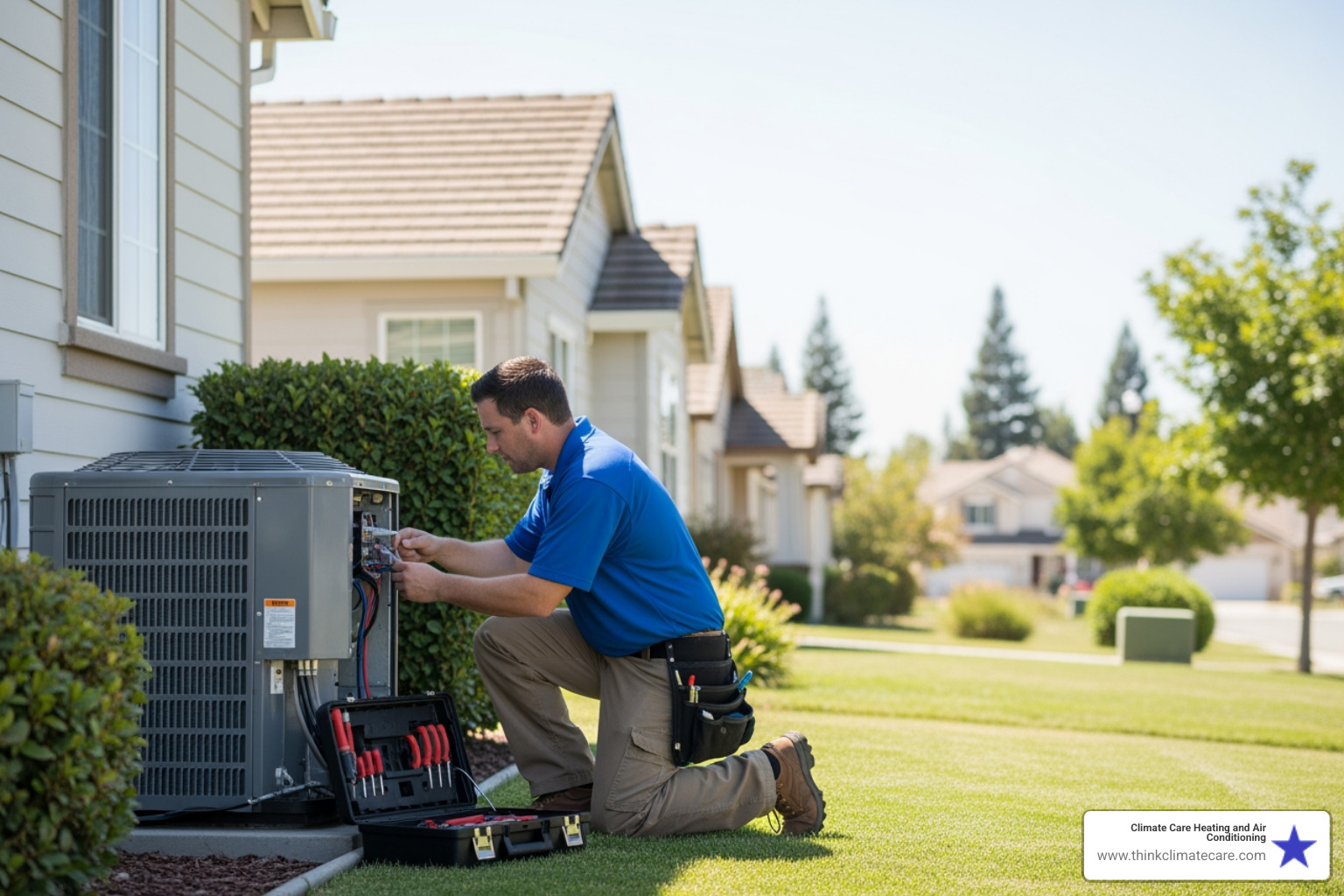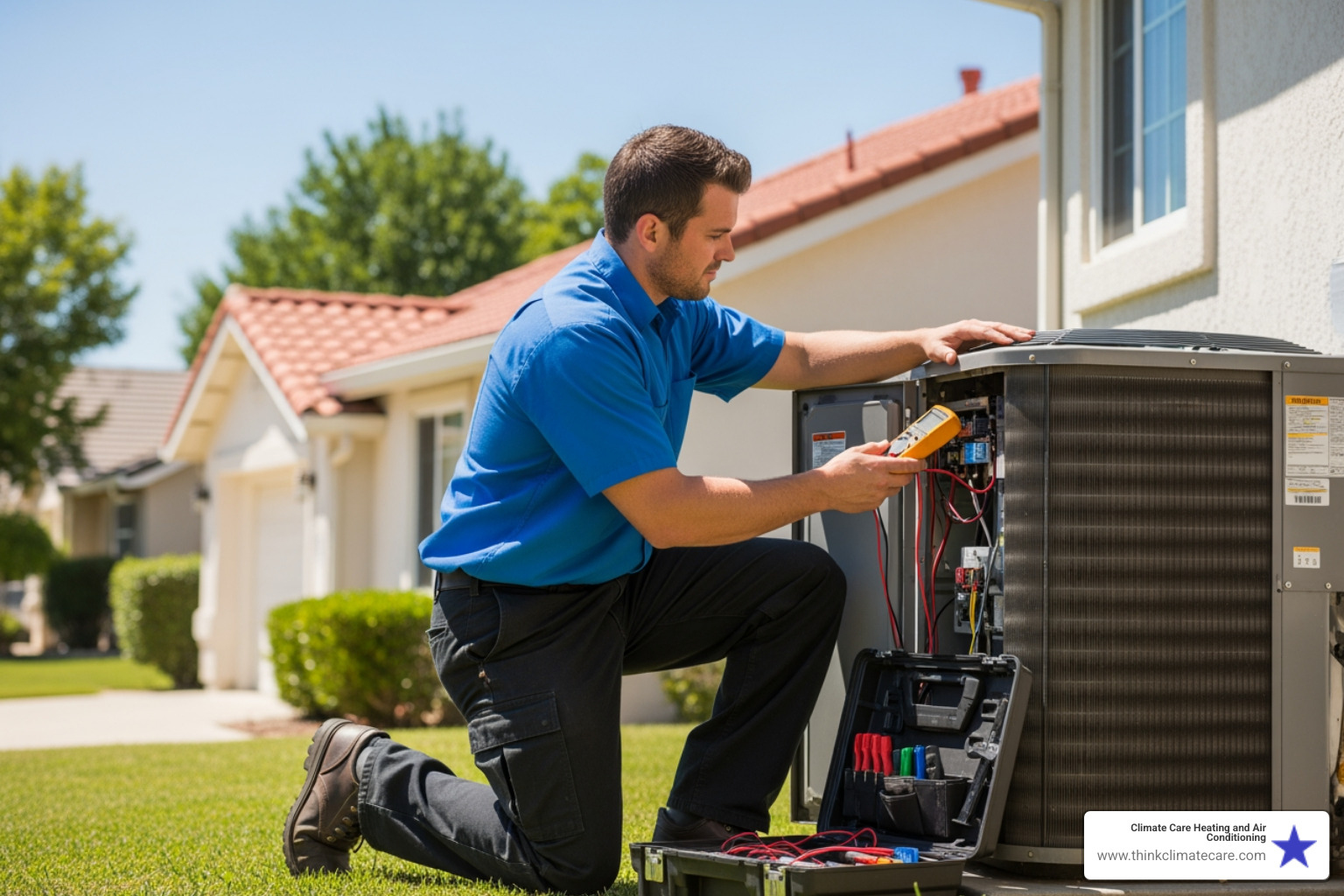Your HVAC, Your Wallet: Making Every Degree Count
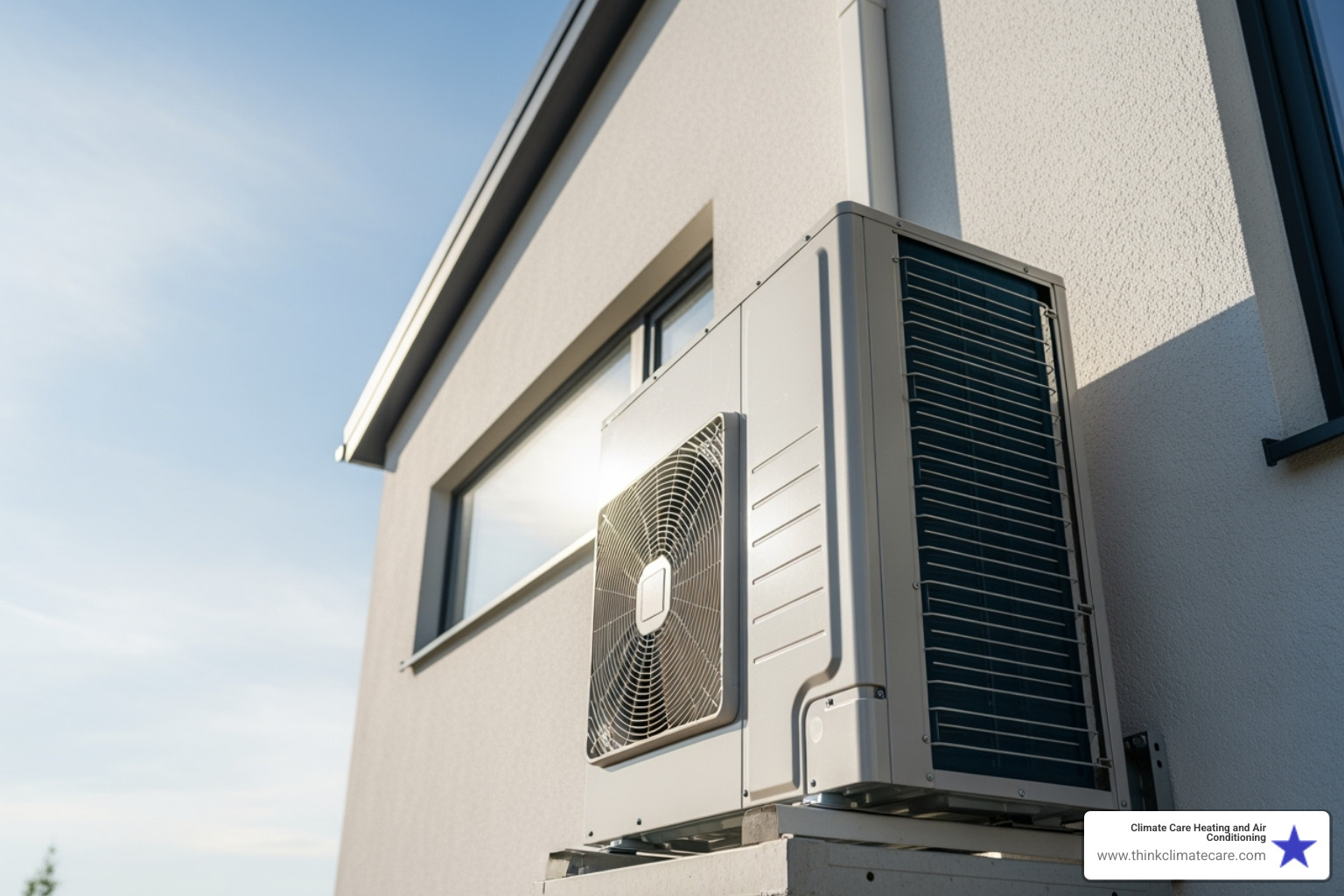
Why HVAC System Efficiency Matters for Your Home and Budget
HVAC system efficiency is about how well your system converts energy into comfort without waste. Here's what you need to know:
Key Ways to Improve HVAC System Efficiency:
- Change air filters regularly - at least every 3 months, monthly if dirty
- Schedule annual professional tune-ups for optimal performance
- Seal and insulate ductwork - can improve efficiency by up to 20%
- Install a smart thermostat - save approximately $100 per year
- Upgrade old equipment - systems over 10 years old waste significant energy
- Ensure proper installation - improper setup reduces efficiency by up to 30%
Nearly half of your home's energy goes to heating and cooling, making your HVAC system the biggest factor in your utility bills and comfort.
The reality is stark: A dirty filter forces your system to work harder. Leaky ducts can waste 20-40% of conditioned air, and an improperly sized system wears out faster while driving up costs.
The good news is that small changes make a big difference. Upgrading to ENERGY STAR certified models can cut your annual energy bill by nearly $140, and simple maintenance like changing filters prevents expensive repairs and extends your system's life.
While systems become less efficient with age, routine care slows this decline. The Department of Energy estimates that strategic upgrades can save owners of older systems 20% or more annually.
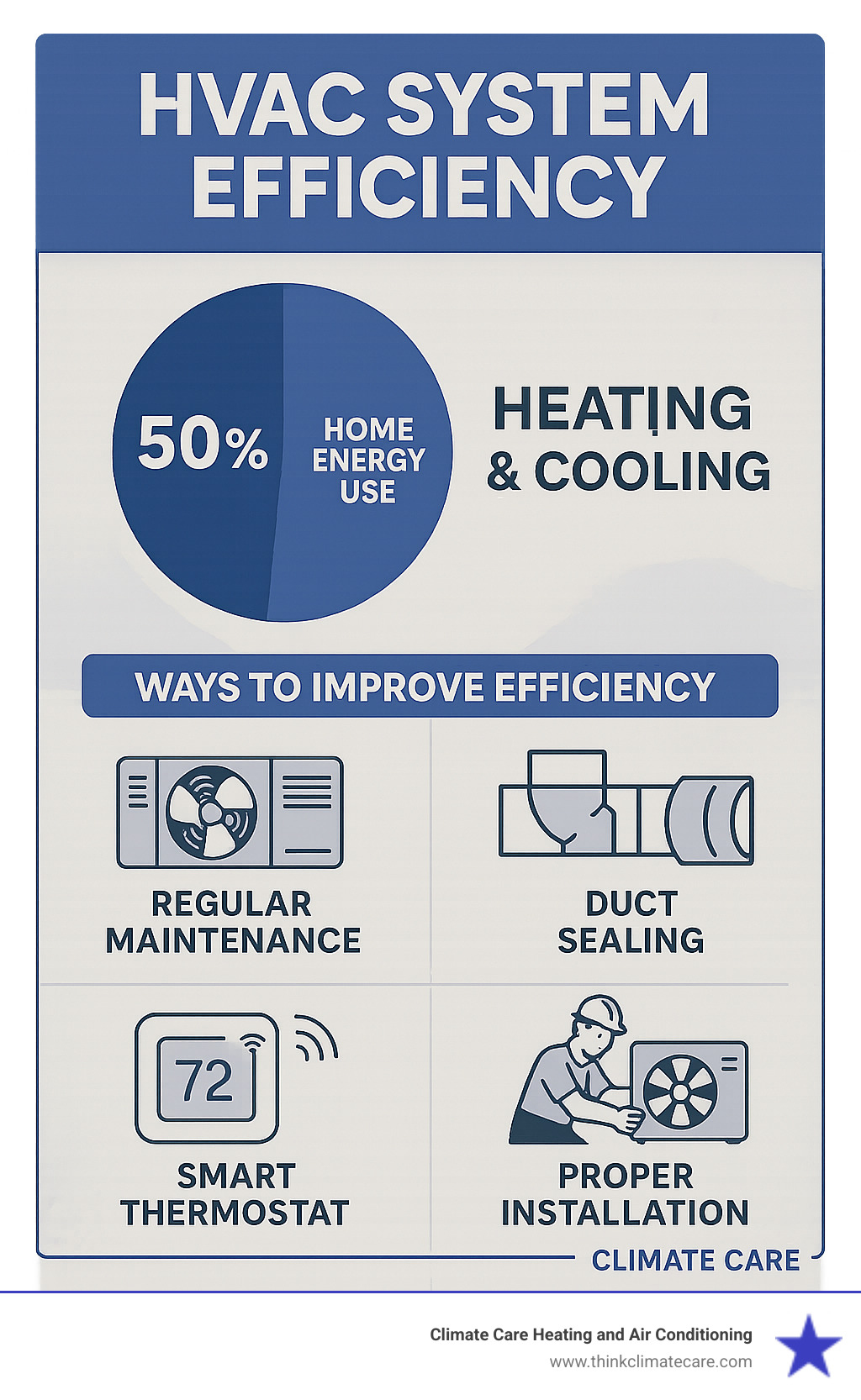
Understanding HVAC Efficiency: More Than Just a Number
HVAC system efficiency measures how effectively your equipment uses energy to maintain your home's climate. It’s about getting maximum comfort for minimum energy, saving you money and reducing your environmental footprint. At Climate Care, we take a holistic approach, ensuring your system performs optimally for years to come.
Why High-Efficiency Systems are Crucial
A high-efficiency system converts energy into heating or cooling with minimal waste. This is crucial because heating and cooling account for nearly half of your home's energy use. Improving HVAC system efficiency directly lowers your utility bills and reduces your household's carbon footprint—a core part of our philosophy at Climate Care. An efficient system can also increase property value. See if your system measures up with our guide on 5 Signs Your HVAC System is Energy Efficient.
Investing in a high-efficiency system brings several key benefits:
- Financial Savings: Lower energy consumption means lower monthly utility bills. Over the system's lifespan, these savings can be substantial, often offsetting the initial investment.
- Improved Comfort & Air Quality: Modern systems provide more even temperatures, reduce hot and cold spots, and operate more quietly. They also support advanced filtration, improving your home's Indoor Air Quality (IAQ) by reducing allergens and pollutants.
- Improved Reliability: High-efficiency units are often built with more durable components, leading to fewer breakdowns and a longer lifespan.
- Reduced Environmental Impact: Using less energy decreases greenhouse gas emissions, contributing to a more sustainable future. Explore resources on environmental conservation from the Department of Energy.
Decoding the Alphabet Soup: Understanding HVAC Efficiency Ratings
When shopping for a new HVAC system, you'll see acronyms like SEER, AFUE, HSPF, and EER. These are standardized ratings that help you compare the energy performance of different units—think of them as an efficiency report card. A higher number generally means a more efficient system. These ratings are crucial for understanding how much energy a system uses to heat or cool your home. Here's a breakdown:
| Rating | What It Measures | Used For | What's a Good Rating (General) |
|---|---|---|---|
| SEER | Seasonal Energy Efficiency Ratio (Cooling) | Air Conditioners & Heat Pumps | 15+ (ENERGY STAR starts at 14.5, up to 28) |
| EER | Energy Efficiency Ratio (Cooling at Peak) | Air Conditioners (especially window units) | 13+ (Efficient systems) |
| AFUE | Annual Fuel Utilization Efficiency (Heating) | Furnaces & Boilers | 90%+ (High-efficiency) |
| HSPF | Heating Seasonal Performance Factor (Heating) | Heat Pumps | 8.5+ (ENERGY STAR) |
SEER, EER, and Cooling Efficiency
When the summer heat is on, SEER and EER ratings are key for your cooling system.
- SEER (Seasonal Energy Efficiency Ratio): This is the primary rating for central air conditioners and heat pumps. It measures efficiency over an entire cooling season, much like a car's annual MPG. A higher SEER means greater efficiency. The current minimum is 13, but high-efficiency ENERGY STAR units start at 14.5 and can go as high as 28.
- EER (Energy Efficiency Ratio): EER measures efficiency at a peak outdoor temperature (95°F), making it useful for judging performance on the hottest days. It's the ratio of cooling capacity (BTUs/hour) to power input (watts). An EER of 13 or more is considered efficient. Learn more about central air conditioners.
AFUE, HSPF, and Heating Efficiency
For heating, look at AFUE and HSPF ratings.
- AFUE (Annual Fuel Utilization Efficiency): This rating is for furnaces and boilers. It's a percentage that shows how much fuel is converted into usable heat. An 80% AFUE furnace converts 80% of its fuel to heat, losing 20%. High-efficiency models have AFUE ratings of 90% or more.
- HSPF (Heating Seasonal Performance Factor): This rating is for heat pumps in heating mode. Like SEER, it measures seasonal efficiency. A higher HSPF means greater efficiency. The minimum is 8.2, with ENERGY STAR models requiring 8.5 or higher. Learn more about furnaces and boilers.
Finding and Verifying ENERGY STAR® Certifications
To easily identify efficient products, look for the blue ENERGY STAR® label. This program from the EPA and DOE certifies products that meet strict energy efficiency guidelines, exceeding federal minimums. For example, an ENERGY STAR certified AC unit must have a SEER of at least 14.5, compared to the minimum of 13.
Choosing ENERGY STAR equipment can also qualify you for financial incentives like rebates and tax credits, which help offset the initial investment. We at Climate Care can help you steer these programs. It's always a good idea to check for available rebates and incentives in your area to maximize your savings.
Actionable Strategies to Boost Your HVAC System Efficiency
Knowing the ratings is just the beginning. True HVAC system efficiency comes from how you maintain and use your system daily. At Climate Care, we help you implement smart strategies to ensure your system runs smoothly, keeping you comfortable while lowering energy bills.
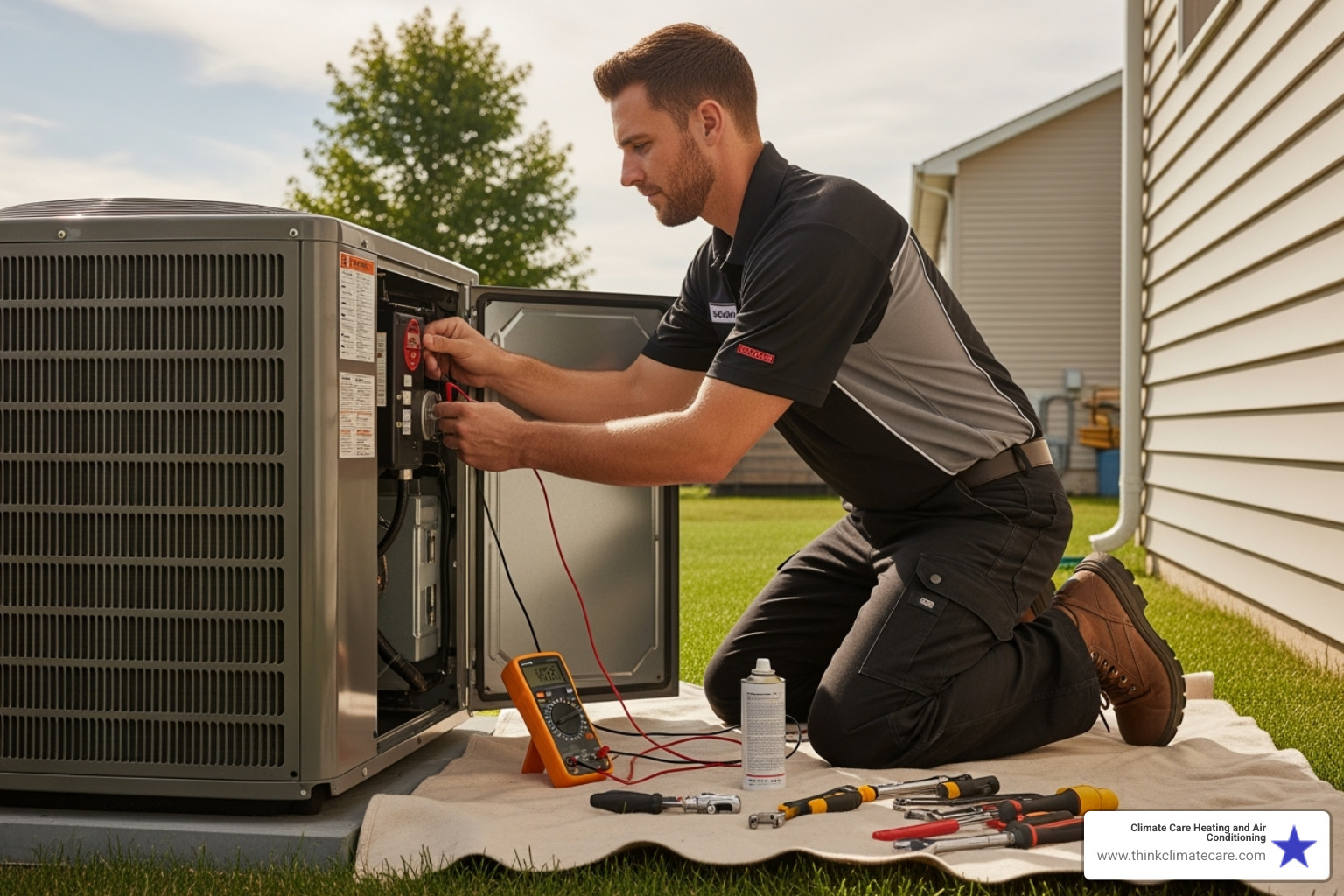
Get started with our 5 Easy HVAC Cost-Saving Tips for Homeowners.
The Power of Maintenance and Cleanliness
Regular maintenance is the easiest and most impactful way to boost HVAC system efficiency.
Start with your air filter. A dirty filter restricts airflow, forcing your system to work harder and waste energy. Check your filter monthly and change it at least every three months to improve efficiency and prevent costly repairs.
An annual professional tune-up is also essential. A certified Climate Care technician will clean critical components like coils, check refrigerant levels, and inspect electrical connections. This proactive care maintains peak efficiency, catches small issues before they become major breakdowns, and can prevent an efficiency loss of up to 30% from neglect.
Smart Thermostats and Zoning Systems
Smart technology is a game-changer for HVAC system efficiency.
Smart thermostats learn your routines, adjust temperatures automatically when you're away, and allow remote control via your smartphone. ENERGY STAR certified models can save around $100 a year and provide energy usage reports for more insight.
For ultimate control, a zoning system allows you to set different temperatures for different areas of your home. Using dampers in your ductwork, it directs conditioned air only where needed, preventing energy waste in unoccupied spaces. This is ideal for multi-story homes or rooms with uneven temperatures. Note: Never manually close vents to create zones, as this can damage your system. Learn more in our post on The Future of HVAC: Embracing Smart Technology for Energy Savings.
Sealing the Leaks: Ductwork and Insulation
Your home's hidden energy culprits are leaks. Even a new, efficient HVAC system wastes money if conditioned air escapes. Improving your home's structure is key to overall HVAC system efficiency.
Ductwork is a major offender. The Department of Energy estimates leaky ducts can waste 20% to 40% of conditioned air. Sealing and insulating ducts, especially in attics or crawl spaces, can improve efficiency by 20% or more. A professional duct test can pinpoint and seal these leaks.
Beyond ducts, your home's "envelope" (roof, walls, windows, foundation) is critical. Poor insulation and air gaps force your HVAC system to work overtime. Ensure your attic, walls, and crawl spaces are properly insulated and seal common air leak spots:
- Around window and door frames
- Where walls meet the ceiling in the attic
- Around plumbing, wiring, and light fixtures
- Around exterior vents and fans
- Where the foundation meets the walls
- In unsealed ductwork connections
Fixing these issues lightens the load on your HVAC system, improving efficiency and comfort.
Beyond the Unit: Factors That Impact Real-World Efficiency
Efficiency ratings are a great starting point, but real-world HVAC system efficiency depends on more than just the unit. Factors like your home's structure, system installation, and local climate all play a significant role. At Climate Care, our holistic approach considers your entire home environment to maximize comfort and savings. Learn more on our page about HVAC System Efficiency.
How Proper Sizing and Installation Affect HVAC System Efficiency
Proper sizing and installation are critical for performance.
Proper sizing ensures your system isn't too big or too small. We use detailed load calculations—considering square footage, insulation, windows, and climate—to find the perfect fit. An oversized system will "short cycle," turning on and off frequently. This fails to dehumidify properly, causes excess wear, and reduces efficiency. An undersized system will run constantly, unable to keep up, leading to high bills and premature failure.
Professional installation is just as crucial. Improper installation can reduce a system's efficiency by up to 30 percent, making a new unit perform like an old, inefficient one. Issues like incorrect refrigerant levels or poor duct connections waste energy. That's why Climate Care uses NATE-certified technicians to ensure every installation is done right.
The Critical Role of Your Home's Envelope and Climate
Your HVAC system interacts constantly with your home's structure and the local climate.
Your home's envelope—its walls, roof, windows, and doors—is its protective shell. A leaky or poorly insulated envelope forces your system to work harder to maintain temperatures, wasting energy.
Your climate zone also dictates the best system for your needs. In hot, humid areas like the Central Valley, an AC's ability to dehumidify is as important as its cooling power. In colder regions, a heat pump's HSPF rating is more critical. Our team at Climate Care understands our region's unique climate challenges and can recommend the most efficient solutions for your home.
Frequently Asked Questions about HVAC System Efficiency
It's natural to have questions about HVAC system efficiency. Here are answers to some of the most common inquiries we receive from our customers.
What is the fastest way to improve my HVAC efficiency?
The fastest way to boost HVAC system efficiency is to change your air filter regularly. A clogged filter restricts airflow, forcing your system to consume more energy and risking damage. Check your filter monthly and replace it at least every three months. Another quick, low-cost fix is sealing air leaks around windows and doors with caulk or weatherstripping to prevent conditioned air from escaping.
How much can I really save by upgrading to a high-efficiency system?
Savings vary based on your climate, energy rates, and your old unit's efficiency, but they can be substantial. Upgrading from an old 10 SEER unit to a modern ENERGY STAR® certified system (14.5 SEER or higher) can cut your annual energy bill by nearly $140. The Department of Energy estimates that owners of older systems can save 20% or more annually with an upgrade. While the upfront cost is higher, long-term energy savings and available rebates often make it a worthwhile investment.
Does a higher SEER rating always mean a better system for my home?
Not necessarily. While a higher SEER rating indicates greater potential efficiency, it's not the only factor. Proper installation, correct sizing, sealed ductwork, and good insulation are just as critical. A high-SEER unit that is improperly installed or sized can perform poorly, waste energy, and fail to dehumidify your home properly. A holistic assessment is needed to ensure the system you choose delivers maximum HVAC system efficiency for your specific home.
Conclusion: Invest in Comfort and Savings
Prioritizing HVAC system efficiency is one of the smartest investments for your home. It's a holistic approach that leads to significant financial savings, improved comfort, better indoor air quality, and a reduced environmental impact. It’s about making every degree count, ensuring your home is a comfortable haven without draining your wallet.
At Climate Care, we are your partners in achieving ultimate home comfort and efficiency. We offer expert guidance and service across Manteca, Sacramento, Modesto, and our many service areas: Antelope, Carmichael, Ceres, Citrus Heights, Elk Grove, Elverta, Escalon, Fair Oaks, Folsom, French Camp, Galt, Lathrop, Lodi, Mountain House, Natomas, North Highlands, Oakdale, Orangevale, Patterson, Rancho Cordova, Rio Linda, Ripon, Riverbank, Rocklin, Roseville, Salida, Stockton, Tracy, Turlock, and Woodbridge. Our holistic approach focuses on performance, cost-efficiency, and environmental standards, backed by a membership plan for savings and priority service.
Whether you're considering an upgrade, need a tune-up, or want to understand your system better, our NATE-certified technicians are here to help. Take control of your energy bills and experience the peace of mind that comes with an efficient HVAC system.
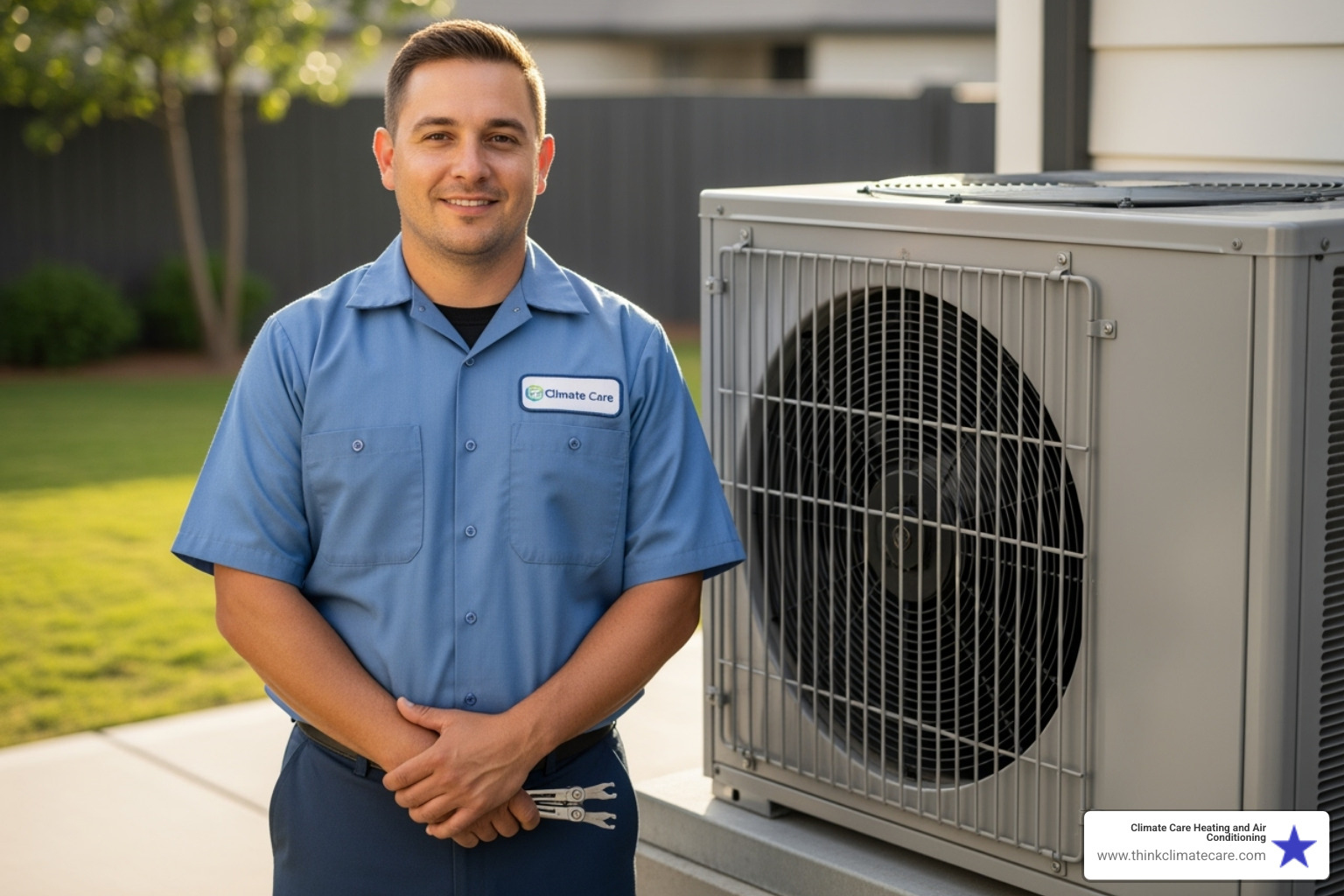
Ready to optimize your home's comfort and start saving? Learn more about high-efficiency heat pump installation in Sacramento or contact us today for a consultation!
Customer Testimonials
Our customers love our service and support.












